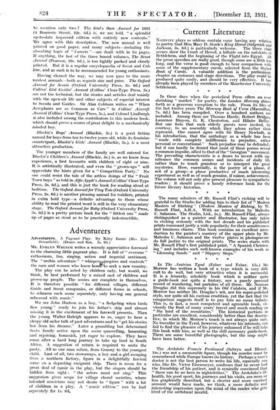Adventurer s Ma. EVELYN WRENCH writes a warmly appreciative foreword
to the charming little pageant play. It is full of " overseas " enthusiasm, fun, singing, action and imperial sentiment. The "urchin adventure" " whispernspires and controls" the men and women who leave homto seek a new country.
The play can be acted by children only, but would, we think, be best performed by a mixed cast of children and grown-up people. The scenes are complete in themselves, It is therefore possible " for different villages, different Guide and Scout companies, or different forms in schools, to rehearse each scene separately, only having one general rehearsal with music."
We see John Hudson as a boy, " a fledgeling when birds flew young," ready to join his father's ship and almost missing it in the excitement of his farewell presents. Then the young Walter Raleigh appears to us, eager to hear a sleepy old sailor talk of past adventures and to "get his stories hot from his dreams." Later a grumbling but determined Scots family arrive upon the scene quarrelling, lamenting and rejoicing, homesick, yet eager to explore. They have come after a hard long journey to take up land in South Africa. A suggestion of return is required to unite the party. All as one man refuse, from Granny to the youngest child. Last of all, two stowaways, a boy and a girl escaping from a northern factory, figure in a delightfully farcical scene on a departing emigrant ship. There is room for a great deal of music in the play, but the singers should be hidden from sight : " the actors must not sing." This :Zuggestion gives scope for village choral societies, where talented musicians may not desire to " figure " with a lot of children in a play. A " music edition " can be had separately for ls. Od.










































 Previous page
Previous page